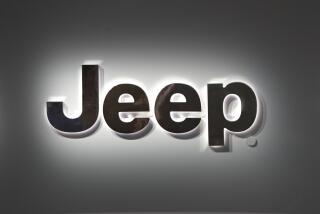Chrysler reverses course, agrees to repair Jeeps
Two weeks after defiantly refusing a government request to recall 2.7 million Jeeps prone to dangerous fires in rear-end collisions, Chrysler has reversed course and agreed to repair many of the vehicles.
The move helps the automaker avoid what could have been a drawn-out showdown with the National Highway Traffic Safety Administration. But by choosing to blink in a high-stakes game of chicken, Chrysler may in fact come out the big winner.
That’s because the proposed repair — installing low-cost trailer hitches — could prove far less expensive than other potential remedies. By pushing back against NHTSA, experts say, the automaker may have persuaded the regulator to agree to the cheaper fix, affecting a smaller group of vehicles, to avoid litigation that neither side wanted. Rather than recalling the full 2.7 million trucks, Chrysler said it would recall 1.56 million.
“This seems to be something of a strategic move,” said Allan Kam, a former senior NHTSA attorney who now consults on auto safety issues. “NHTSA might never have accepted that fix prior to Chrysler’s initial refusal.”
The regulator has been investigating two Chrysler models — the 1993 to 2004 Grand Cherokee and 2002 to 2007 Liberty — for well over two years. It eventually determined that a defective fuel tank design made them prone to gasoline leaks and fires after crashes. NHTSA identified more than 50 deaths from such accidents and said the trucks were far more susceptible to fires than comparable models made by other companies.
Early this month, the agency asked Chrysler to recall the vehicles, but it didn’t prescribe a specific repair. To the surprise of many people, the Auburn Hills, Mich., automaker said it would refuse to comply. The company argued that its vehicles were free of defects and that NHTSA’s statistical methodology was flawed.
Such a show of resistance is exceeding rare; no automaker had refused a recall request in more than two years. It led to speculation that the case could end up in court — NHTSA’s last remedy to force a recall — and hurt Chrysler’s image.
But the impasse also put pressure on NHTSA, which has rarely taken such cases to trial and has a mixed record when it does. If a legal battle with Chrysler went poorly, it could encourage other automakers to follow suit.
After its refusal, Chrysler continued to meet with NHTSA behind closed doors, and it was expected that the automaker would refuse to budge.
Instead, Chrysler said Tuesday that the two sides “have resolved their differences” and that it would begin a voluntary campaign to install the steel hitches, which would provide an additional layer of protection behind the fuel tank.
The company said it “recognizes that this matter has raised concerns for its customers.” It said the recall would include the 1993 to 1998 Grand Cherokee and 2002-07 Liberty. The recall does not include 1999 to 2004 Grand Cherokees. Vehicles already equipped with a trailer hitch will not get a repair, but those with damaged hitches may be eligible for replacement.
In a statement, NHTSA said it is “pleased that Chrysler has agreed to take action to protect its customers and the driving public.”
The regulator did not refer to the vehicles as defective. That’s noteworthy because in its letter to Chrysler this month, NHTSA said the Jeeps “may contain a defect that presents an unreasonable risk to safety.” Chrysler is facing numerous injury and death lawsuits over the Jeeps and a defect finding could hurt it in those cases.
Compared with remedies such as moving or modifying the puncture-prone fuel tank, mounting trailer hitches will be relatively inexpensive for Chrysler, especially since many of the affected Jeeps already have them installed.
Whether attaching an extra steel bar to the vehicles’ frames will prove sufficient to protect drivers is not yet clear.
Clarence Ditlow, executive director of the Center for Auto Safety, which originally petitioned NHTSA to investigate the Jeeps in 2009, said the fix should be thoroughly crash-tested before being formally accepted by the regulator.
His group has identified more than 300 fire-related deaths in the Grand Cherokee and Liberty and has recommended repairs that would specifically protect the fuel system, including adding a skid plate beneath the tank.
“If the modified Jeeps do not pass,” Ditlow said, “we call on NHTSA to require Chrysler to develop a more effective remedy.”
He and others have compared the Jeeps to the infamous Ford Pinto of the 1970s, which also had a fuel tank that could rupture and ignite in rear-impact crashes. After a prolonged fight with regulators, Ford was forced to make significant modifications to the tank at significant cost.
One concern about Chrysler’s proposed fix is that it might not protect motorists from so-called underrun crashes in which the impacting car is low enough to slide under the rear bumper and strike the tank directly.
Sean Kane, an auto safety consultant, said the fix fell short of what he had hoped for, but he wasn’t surprised that NHTSA agreed to it.
“It’s certainly not a silver bullet,” said Kane, noting that he had reviewed at least one case of a fire in a Grand Cherokee that had a trailer hitch installed. “Resisting the recall was part of the plan” for Chrysler, he added. “I look at it as a natural step in the negotiation.”
More to Read
Inside the business of entertainment
The Wide Shot brings you news, analysis and insights on everything from streaming wars to production — and what it all means for the future.
You may occasionally receive promotional content from the Los Angeles Times.










